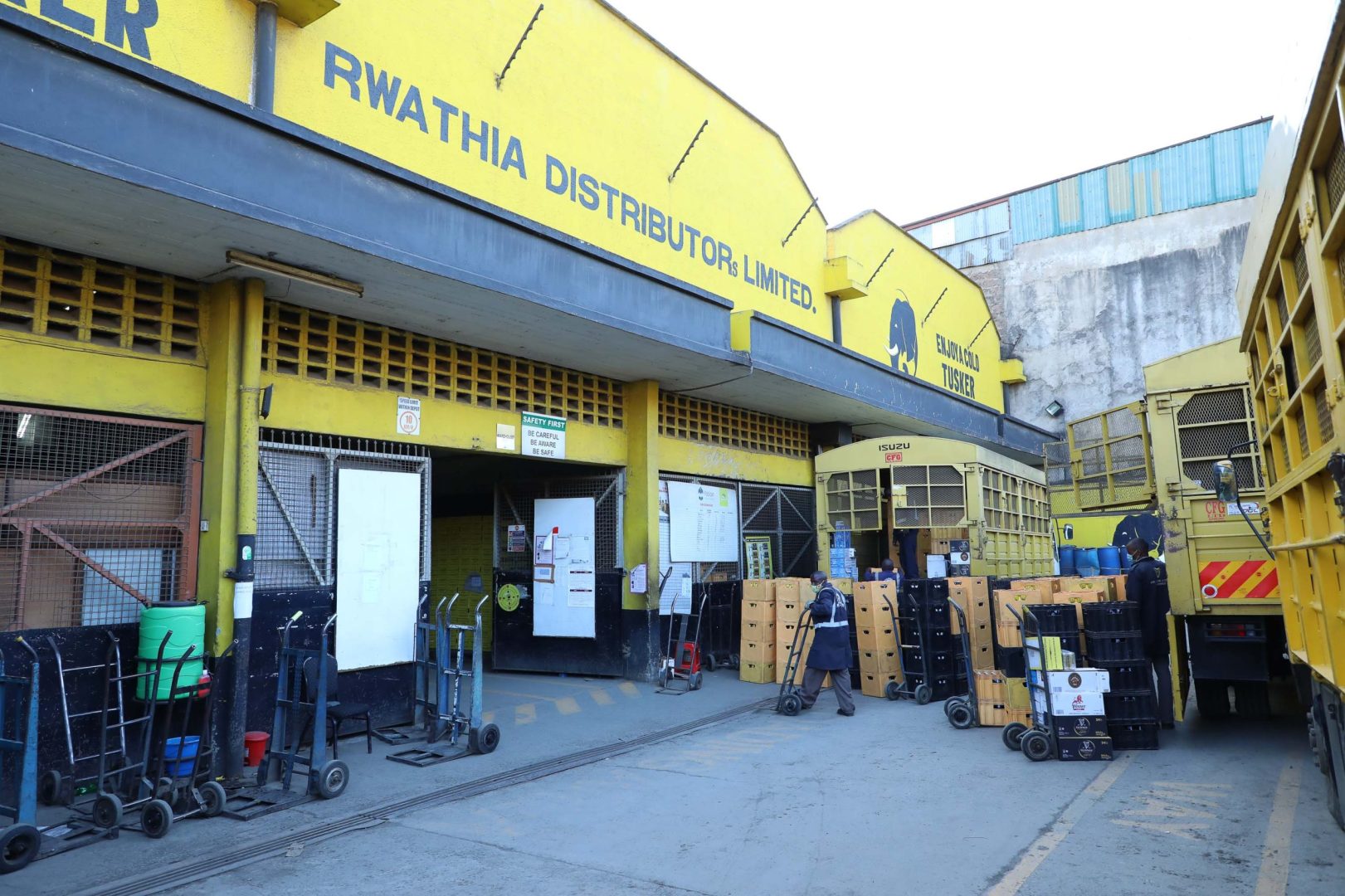Businessman Maina Gikonyo is not famous. His name might hardly ring a bell. In any event, his given and surname are so ubiquitous that they can be found in practically every village in Central Kenya or families with roots in Central Kenya.
But the grey-haired, soft-spoken, and unassuming Gikonyo, who sits at the helm of Rwathia Distributors, is a household name at Kenya Breweries Ltd, one of East Africa’s foremost blue-chip firms.
You will find Gikonyo easily weaves in and out of corporate conversations with Jane Karuku, the Group MD and CEO East African Breweries Limited (EABL) at business growth and development sessions. He’s equally at ease while socialising at whiskey tasting sessions hosted by Kenya’s century-old brewer for those who love a sophisticated twist and a tale to their tipple.
He deserves a seat at the table at Kenya’s century-old brewer and one of Kenya’s biggest companies. Rwathia is KBL’s largest distributor, supplying in the region of 600 bars, hotels, and clubs and turning over a significant percentage of the beverage maker’s distributor business.
Rwathia is a family business but not in the strictest sense of it. It is owned by a group of families whose original locale is Rwathia location in Kangema, Murang’a County, about 118 kilometres north of Nairobi. The board is chaired by Maina’s father, the indefatigable 105-year-old Gerald Gikonyo Kanyuira.

Rwathia Distributors is one of Kenya’s oldest family business success stories where the second generation seamlessly and successfully took over the running of the firm from the founders.
Another sterling family success is the security services firm Securex. Tony Sahni studied in Kenya and the United Kingdom and after his studies, he tried his hand at different businesses in the U.K. and then in Kenya.
After several years doing business elsewhere, he discovered that his father’s security services business, 1970, was always tugging at his started half a century ago in heart.
His dad, Kishora Lal Sahni, embraced his son when he sought to join the business, and the resulting tag-team created a more powerful force that has grown the business both in reach and scale.
The odyssey has only just begun. Tony’s youngest son studied Electrical Engineering, did a business management course, then, on his own volition, pursued a Masters in Counter-terrorism and Organized Crime. Now, he has started working in the business with a lot of leeway from his father to make the leap if he wants.
Starting a family business is no mean feat. Yet, family businesses are the significant majority of firm around the world. It is estimated that globally, family businesses contribute between 70 to 90 per cent of the world’s Gross Domestic Product.
“When you look at the US, Canada, India, Australia, 80 to 90 per cent of the companies in those countries were founded by an entrepreneur who had and ran with it. Walmart, passion, who set up a business BMW, Hyatt chain of hotels and Samsung, are some of the businesses that were started as entrepreneurial ventures but grew into huge multinational corporations,” says Paul Ouma, Coach, and Founder of the Institute of Family Business.
In Kenya, about 70 percent of the privately-owned companies are family-owned.
According to a report by Asoko Insights on East Africa’s family-owned business landscape, family- owned businesses within the agriculture, food, and beverage sectors together represent the second-largest concentration of leading businesses in the country and are estimated to earn more than $10 million a year.
So, how does one grow a business from a dinner table conversation into a forceful brand?
In a November 2020 KPMG barometer from a study in Africa, family businesses were in agreement that it is important to build relationships based on trust with all their stakeholders (employees, the community, customers, and suppliers) and not just with family members. In addition, 65 per cent of respondents agreed that the emotional bond among family members is powerful and often helps them maintain a positive self-concept in their family business.
There are two main ways family-run enterprises operate: they are either owner-managed or owner-controlled. Owner- managed means that the company’s owner or founder holds an executive role in the business, maintains oversight, and makes critical operational decisions on its daily management.
Owner-controlled means that the founder has brought in professional talent of senior managers to run the business. The owner or founder has a say in the strategic direction the company takes.
Experts say that family business founders and leaders need to have a vision and a strategic plan to grow a modest family business into a powerhouse. “You have to move into a situation where you’re not the one doing everything. So, you have to learn how to delegate.
When you delegate, you need to have structures, and this pushes you to create organisational or departmental structures. As you establish these structures, then governance comes in because the organisation needs to be governed. That’s where you now say, look, I need to have an advisory board and a board of directors. These people will help the founders to run the business better,” says Ouma.
At a CEO’s summit for African family-led businesses, Darshan Chandaria, himself a second-generation Kenyan business leader, said; “Drafting a family charter is very important for family businesses. It’s crucial for addressing obvious things, like compensation, and codifying them.”
Setting up suitable family governance structures is important because it ensures unity and focus among the family members who are also the business owners. This enables them to have discipline and trust to grow the business. Antoinette Wa-Tindi, Membership & Partnership Director at the Association of Family Business Enterprises (AFBE), says that this involves having a family constitution, shareholder agreements, a family council, and holding regular family meetings. These are some of the effective ways to address the interactions between family and business.
“These are the structures and practices that many family businesses globally and even locally have put in place. They have proven to be an ideal way of addressing how or when a member is eligible to join the business, how conflicts between family members are addressed, and the responsibilities and roles of each family member in the business,” says Wa-Tindi.
In addition to developing governance systems, family values form the basis of what is important and how issues are handled. These values are based on the founder’s beliefs, such as integrity, respect, or religion. Ramco is the oldest family-run business in Kenya. It dates back to 1948. Today it is chaired by one of the original entrepreneur’s sons, with members of the third generation holding top management positions.

According to the KPMG survey, most African family businesses are relatively young compared to their counterparts in other regions around the world.
“This provides a great opportunity for African family businesses to learn best practices from older and more established family businesses which, if implemented, could enable African family businesses to thrive and continue to drive economic growth across the African region,” says the report from the survey. “The Africa Free Trade Agreement is going to provide African family businesses with many more opportunities, but they will need to ensure that they are ready for this growth, the increased competition and the need to be more innovative.”
The generations in families also form great building blocks for family businesses. Some family business leaders deliberately pursue this course by tasking their children with simple assignments at the business premises over the weekend or during the school holidays.
“The last thing on young business owners’ minds is what to do when they’ve finished running their businesses. You must begin with the end in mind if you are to build a multigenerational business. That is how the founder is able to manage succession. It’s a relay race,” says Ouma.
According to Dr. James Wanjagi, a part-time consultant at Strathmore Business School and founder and CEO of Iricon Training and Consultancy, successful family businesses should provide education for both the family and the company.
“Formal education is important, but the natural, informal education from parents to children where they see the excitement of entrepreneurship from the onset often leaves a lasting impression,” says Wanjagi.
To ensure seamless, informal family business education from parents to children, the next generation should be integrated into the family business as soon as they are old enough to be involved.
“When it comes to the next generation’s formal education, the first step is finding one or two leaders from the same (next) generation who can be champions, who can convince others in their generation that it is important, relevant and worthwhile. The forming of a ‘Next-Generation Education Committee’, choosing the best, brightest, and most interested to lead the process,” says Wanjagi.
Business leaders or their children can learn strategy, finance, operations, technology, marketing, and governance in business school.
The growing generation learns soft skills training in areas such as communication, formal ways to conduct complex problem solving, benchmarking global firms in the same industry, and family business decision making processes.
Strategy, Wanjagi says, is critical for the success of any business. Due to the COVID-19 pandemic, most businesses, including family-owned, have seen the importance of embedding technology within their operations and developing a digital strategy to drive the business forward.
“Most successful family-owned businesses do not just develop the business strategy, but they also define and develop expansion, growth, financing and marketing strategies to enable them to grow,” he says. “In addition, entrepreneurship is taught after students graduate from either tertiary or other higher- level formal education systems. It is my view that it should be taught earlier and should include project-based learning.”
Ultimately, successful family businesses demand a certain level of accommodation from the founder, like the eldest Sahni allowing Tony the money, space and time to do his own research and travel the world in search of innovative new solutions, or Gerald Gikonyo allowing his son Maina to come into Rwathia Distributors and to bring in the new knowledge and technology on which the company’s growth was founded.
Most family businesses in Africa are relatively young compared to their counterparts in other regions around the world.

 Businessman Maina Gikonyo - Managing Director, Rwathia Distributors - Kenya Breweries Limited (KBL's) largest distributor.
Businessman Maina Gikonyo - Managing Director, Rwathia Distributors - Kenya Breweries Limited (KBL's) largest distributor.









